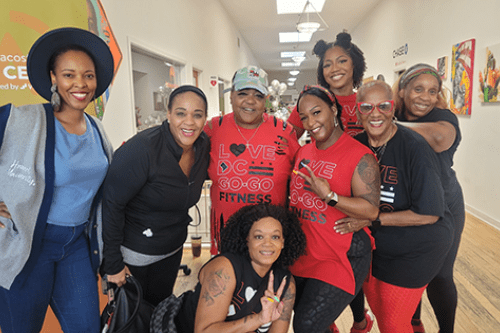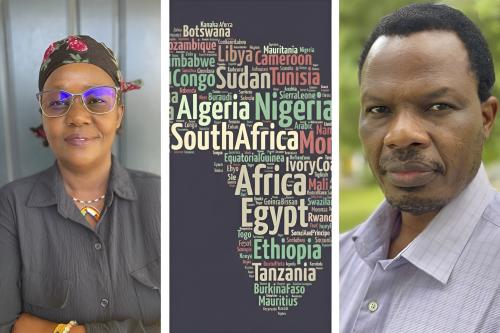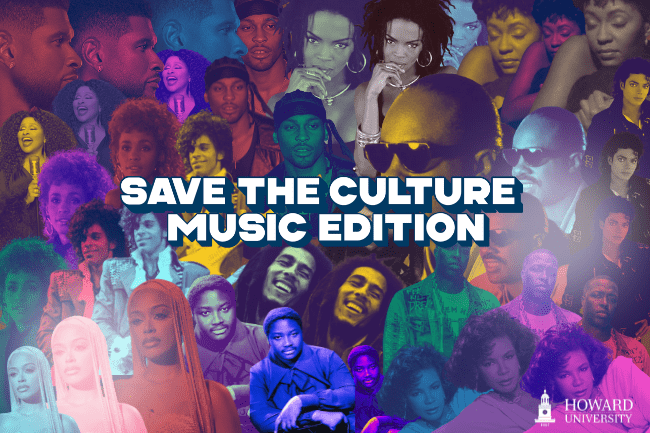Remember when time capsules were a thing?
For the uninitiated, groups of (mostly) students nationwide would accrue the items they felt best represented their era, stow said items in a container of some sort, and hide said container to be one day discovered by future generations as evidence of how we once did things on planet Earth.
Think of this, our SAVE THE CULTURE series, as a modernized version of the time capsule. In 2025, a quarter of the way into this pivotal century and nearly 100 years since the iconic Harlem Renaissance — an era that profoundly shaped Black artistic expression and cultural identity — this project feels especially urgent.
Throughout the summer, our editorial team will be designating 20 (or so) of the works most essential to understanding the Black American experience, in genres ranging from film and television to music and literature, and so much more in between. By spotlighting these landmark creations, we aim not only to preserve and honor the rich legacy of Black culture, but also to inspire ongoing dialogue, foster greater appreciation, and provide future generations with a vibrant record of how our culture thrived at this defining moment in history.
“A great top melody and lyrics that mean something over a timeless groove is worth preserving for the culture. ‘Say It Loud — I’m Black and I’m Proud’ by James Brown is a great example! Put this song in any time capsule and the message still hits the same.”
— Raheem DeVaughn, singer, songwriter, and host of WHUR 96.3 FM Quiet Storm.
There are more than 7,100 known languages spoken in the world, and yet music may be one of the most universal mother tongues to impact Black culture. Music is language, protest, a peacemaker, sermon, and satire. It has guided our ancestors to freedom, served as the soundtrack to our favorite films or plays, and influenced generations. Music ushers in our favorite seasons and holds life’s greatest memories.
As part of the “Save the Culture” series, we were given the lofty assignment of curating a list of songs to put into a “time capsule” to preserve Black culture for all time. To complete this assignment, we enlisted the help of music buffs and industry experts — including Lady London (B.S. ‘16), Tracey Lee, Esq. (B.A. ’92), Jasmine “Jazz” Young (B.A. ’94), and Eric Roberson (BFA ’97) — to critique our choices and help us understand what makes a song worth preserving.
“As a singer, a song is worth persevering when the music, melody, and lyrics create a time machine that sends me back to where I was when I first heard it," said Roberson.
Remember watching your favorite music video drop on “106 & Park?” Rapper and songwriter Lady London went on to explain how a culturally relevant song may not have made that countdown but is no less worthy of our capsule. “Creating a hit song and crafting a culturally impactful song are related but not the same,” said Lady London. One can exist without the other — a hit might chart without leaving a legacy, while a culturally impactful song might not top the charts but lives forever in people’s minds, playlists, and memes.
“I feel Black music is worth persevering, because it is the first true American music form,” continued Roberson. “It has been the soundtrack to so many important and impactful moments in our history. Black music creates portraits of where we’ve been, where we are, and where we hope to go.”
That’s the purpose of our Save the Culture series, and in this installment of it: to, in the way only Black music can, draw us closer together to speak our shared language while paying homage to our culture. And while we recognize that innumerable songs won’t make this list, we hope to create conversation around the preservation of this music for future generations.
Without further ado and with the blessing of our musical subject matter experts, we’ve decided to “preserve the culture” with the following songs, in no particular order (and with a few honorable mentions!).
A Love Supreme Parts I - IV – John Coltrane
John Coltrane’s “A Love Supreme Parts I-IV” is a spiritual journey, with Yardbird in four parts taking us from an “Acknowledgement,” of a higher power, to a “Resolution” that places us on a spiritual path to “Pursuance” — defined as an uphill battle while walking that path. And finally, we land at “Psalm,” a devotion, a prayer, and peace.
All I Do – Stevie Wonder
Written by Stevie Wonder with Clarence Paul and Morris Broadnax, this classic love song was originally recorded by Tammi Terrell, and that version remained unreleased until 2002. Threaded along the central line “all I do is think about you,” the song tells the story of a deeply passionate, all-encompassing love. Known for its soulful slow jam beat with disco undertones, it is a testament to Wonder’s skill as a singer, songwriter, and producer. If you listen closely, you’ll notice backing vocals from Betty Wright, Walter Williams, Eddie Levert of the O’Jays, and Michael Jackson.
As – Stevie Wonder
“It’s a perfect song, said Eric Roberson. "It holds love and romance but also fight and triumph all at the same time. It's the song I would like the future to know about.”
Bad Boy/Having A Party – Luther Vandross
July 1, 2025, marked 20 years since the passing of the legendary Luther Vandross. Narrowing it down to just one of his greatest hits was hard, but Luther’s smooth vocals, the upbeat tempo, and the nostalgia that emerges from sampling Sam Cooke’s “Having a Party” makes this song a must-listen.
Can We Talk – Tevin Campbell
Three years ago, the “Can We Talk” challenge took social media by storm, reminding the world why Tevin Campbell deserves a place on the list of R&B greats. Campell was only 16 when the song — written specifically to suit his voice by Daryl Simmon and Babyface — was released on his second album, “I’m Ready.” The relatable lyrics and infectious beat make for a love song that’s stood the test of time.
For the Love of You – The Isley Brothers
“You got to have the Isley Brothers,” said Tracey Lee, Esq. (B.A. ’92), a lawyer, professor, and recording artist. "[Even the thought of not having the Isley Brothers] on the list is a TRAVESTY. When it comes to saving the culture of Black music, their music is quintessential Blackness.”
Happy Feelin’s – Maze featuring Frankie Beverly
First released by Maze featuring Frankie Beverly in 1977, “Happy Feelin’s” is an anthem of “Black joy,” emotional resilience, and community. It’s a song often played at gatherings of love and celebration, embodying the emotional uplift that is central to the Black experience, especially as a counterweight to systemic injustice.
I Have Nothing – Whitney Houston
Though it was written for the original soundtrack for “The Bodyguard” in 1992, “I Have Nothing” quickly transcended the film, becoming an anthem of vulnerability and strength, especially for Black women who saw themselves in the lyrics. At a time when Black artists were often pushed into genre boxes, Whitney delivered a classic pop ballad with soul at its core. It has since become one of the most performed and best-selling ballads of all time.
Juicy – Biggie Smalls
“It was all a dream; I used to read ‘Word Up!’ magazine, Salt-N- Pepa and Heavy D up in the Limousine.” We all know the lyrics to what may be the ultimate “Mama, I made it” song. The classic “rags to riches” anthem encourages us to believe in the possibility of the American dream. “And if you didn’t know, now you know!”
Killing Me Softly – Roberta Flack
“Killing Me Softly” is more than a beautiful song; it is a soul-piercing story and Roberta Flack’s (B.M.E. ’58, D.Mus. ’75)1973 rendition is gentle but devastating, capturing the raw, unspoken pain of being seen. Flack delivers every line with control, warmth, and vulnerability, offering emotional nuance which is a hallmark of Black musical expression. The song won Flack the Grammy Award for Record of the Year and Best Female Pop Vocal Performance, as well as an Album of the Year nomination.
Lady – D’Angelo
“You have to have D’Angelo, the flagship artist, who is the initial representation of a then newly formed genre, ‘neo soul,’ on this list in some way, shape, form or fashion,” says Lee. The term neo soul was coined in the 1990s by record producer Kedar Massenburg, who helped bring the genre to the forefront with his work with Erykah Badu.
Love Ballad – L.T.D.
“Love Ballad” by L.T.D., featuring lead vocals by the legendary Jeffrey Osborne, is a cornerstone of 1970s Black love music. Released in 1976, the song embodies the lyrical depth, romance, and vulnerability that define classic Black R&B and soul. The song helped shape late-night slow jam culture and continues to be sampled by various artists and make its way onto movie soundtracks.
Lovely Day – Bill Withers
One of the most joyful and uplifting Black music anthems, “Lovely Day” is one of those songs that can immediately improve your mood. It makes us feel like we’ve been transported to the beach (no matter where we are) and expresses a pure form of love. The lyrics and message are simple: No matter what’s going on, there’s something that keeps us balanced, and someone who reminds us that everything will work out.
Me, Myself, and I – Beyoncé
With “Me, Myself and I,” Queen Bey reminded women of their power and strength, even when facing pain and heartbreak. The vulnerability, emotion, and strength in her vocals on this track arguably set her on the path to becoming the icon she is today.
Outstanding – The Gap Band
First, a top Black songs list without the Gap Band is one our mothers simply won’t approve. Uncle Charlie’s simple, yet heartfelt lyrics explained how love can light your fire, satisfy you, and make you feel alive.
P.Y.T. – Michael Jackson
Michael Jackson’s “Thriller” is one of the greatest albums of all time. Opening with “Wanna Be Startin’ Somethin’,” this album is full of back-to-back classics — each of which could have arguably made this list. But the smooth and irresistible ode to all the “tenderonis” in the world (yes, Michael coined the term first), “P.Y.T.” ultimately made this list.
Poison – Bell Biv DeVoe
It’s all New Edition to us — whether with Johnny or without Johnny, Bobby and Ralph as solo artists, or Bel, Biv, and DeVoe as a trio. So, if you wonder why you haven’t seen “Mr. Telephone Man,” “Sensitivity” or any N.E. song on the list, now you have. “Poison,” more than 30 years after its release, remains a party anthem and a summer jam. This cautionary tale about choosing looks over substance also helped introduce the “New Jack Swing” sound to the masses.
Rock Steady – Aretha Franklin
In 1972, the “Queen of Soul” birthed the soul-stirring “Young, Gifted and Black” album, which masterfully journeyed through the complexities of Black identity shortly after the civil rights movement. While the self-titled album track was bold and unapologetically Black, “Rock Steady” lands on our list because of its care-free nature. It’s a fun song that allowed our elders, and now us to dance, laugh, and to let go of the woes of the world — even if only for 3 minutes and 14 seconds.
Sign “O” the Times – Prince
In France a skinny man “died with a big disease with a little name. By chance his girlfriend came across a needle and soon she did the same ... Hurricane Annie ripped the ceiling of a church and killing everyone inside ... You turn on the telly and every story is telling bout somebody died…”” Sign “O” the Times,” released in 1987, speaks to issues we are still facing as a nation: gun violence, poverty, inequality, political apathy, and the possibility of nuclear conflicts. This socially conscious song urged us to see the change needed in the world through stark storytelling sealed with iconic vocals.
Stomp – Kirk Franklin and God’s Property
Did Kirk Franklin and God’s Property take gospel music too far? No! Did we hear “Stomp” in the club? Yes. Is that why it made our list? Yes. This club-banger brought gospel music to a younger generation, blending the genre with R&B and Hip Hop in a way that we’d not yet experienced before. Twinkie Clark walked us to the door, but Kirk Franklin and God’s Property kicked it in, energizing the contemporary gospel genre and birthing artists like Tye Tribbett and Lecrae.
Scenario – A Tribe Called Quest
“Facts:” A Tribe Called Quest’s “Low End Theory” is one of the best Hip Hop albums of all time, “Scenario” is one of the best Hip Hop posse cuts of all time, and Busta Rhymes became a star when he recorded his verse. The competitive spirit on the song is evident from verse to verse, starting off with Phife Dawg’s “Bo knows this, and Bo knows that, but Bo don’t know jack, ‘cause Bo can’t rap,” with Charlie Brown, Dinko D, Q-Tip the Abstract, and of course Busta all adding their signature styles to the track.
U Don’t Have to Call – Usher
The entire “8701” album is an undeniable contribution to R&B and the culture, and “U Don’t Have to Call” is its classic break-up to rebound song. Produced by the Neptunes (Pharell Williams and Chad Hugo), the instantly recognizable beat helped define the sound of the early 2000s.
This Christmas – Donny Hathaway
How could we leave Donny Hathaway off a Howard University list? The Donny who gave us our national Black Holiday Song. The same Donny that asked, “Where is the Love,” and sang “Someday We Will All Be Free!” There are just so many hits in Mr. Hathaway’s catalogue to choose just one, any of which could clearly make this list. But, this winter classic made is a tops the essentials list of all the experts and music aficionados alike.
What’s Going On – Marvin Gaye
“Mother, mother, mother,” are the first words Marvin Gaye crooned — or maybe wailed, or even pleaded — on “What’s Going On,” and those words carried us through this powerful song, which sought answers to some of the most urgent questions of the day. Why are we at war? Why is there so much brutality? More than 50 years later, we are still asking ourselves these questions, making this song as relevant today as it was yesterday.
Honorable Mentions
- You Bring Me Joy – Anita Baker
- Alright – Kendrick Lamar
- Howard Girl – Eric Roberson (featuring Brandon Hines, Geno Young, and Aaron Abernathy)
- It Takes Two – Rob Base & DJ EZ Rock
- Children’s Story – Slick Rick
- No Woman No Cry – Bob Marley
- Running Away – Roy Ayers
- Next Lifetime – Erykah Badu
- Doo Wop (That Thing) – Lauryn Hill
- Forever My Lady – Jodeci
- Somebody Loves You Baby – Patti Labelle
Lists are Never Perfect, but We Tried
After surveying, with fresh eyes and ears and feedback, we did realize that we missed Public Enemy’s “Fight the Power,” Grand Master Flash and the Furious Five’s “The Message."
Why These Lists Cause So Many Problems
While researching “Top Music Lists,” many of the same themes kept coming up, including tokenism, overrepresentation of “the usual folks,” and the exclusion of voices. For example, this list doesn’t include any funk or jazz, which again, isn’t purposeful.
Recency bias is defined as a cognitive bias that favors recent events over historic ones, which is another factor that complicates curating lists like this one. Could that be why Usher made it over Smokey Robinson, Lionel Richie, Rick James, or Donny Hathaway?
Or did nostalgia influence the “cookout” and “reunion” additions? Possibly. That's why we asked our experts to vet the list, though they, too, are susceptible.
“Lists always create drama and lots of opinions that don't align,” explained Gordon Chambers, a singer-songwriter and record producer who wrote and produced for Beyoncé, Anita Baker, Patti Labelle, Usher, and more. “However, I support anything that is for the preservation of soul and R&B music. We are living in a time where Black music is often imitated and appropriated by other communities than its creators.”
“My only addition would be Nas ‘I Can,’” said Lady London, illustrating this point. “It was a pivotal song I thought inspired the youth when hearing it.”
It’s critical to honor the incredible contributions of Black artists and their ongoing influence on the global stage. Each generation brings its own unique creativity, presentation, and interpretation, making Black music a continuously evolving artistic expression. Respecting and appreciating these evolving forms allows us to honor the roots that ground us while embracing the innovative voices that propel us forward.
“Black Music is one of the most vital and enduring elements of our cultural heritage, serving as a powerful expression of history, resilience, and identity,” said Jasmine “Jazz” Young (B.A. ’94), director of the Warner Music Blavatnik Center for Music Business.
Listen along to the “Save the Culture: Music Edition” Spotify Playlist, featuring all 30 songs mentioned in this article and let us know what songs you would add to the list.
Send your additions to magazine@howard.edu.
Keep Reading
-
 News
NewsJoin the ‘Transformation to Triumph Black Women’s Summit’ and Become Part of a Global Network of Support
Feb 24, 2026 4 minutes -
 Global and Diaspora
Global and DiasporaHoward University Conference Highlights African Languages at a Critical Moment
Feb 17, 2026 3 minutes -
 News
NewsHoward School of Social Work Students Travel to Cape Town to Serve the Community
Feb 11, 2026 5 minutes
Find More Stories Like This
Are You a Member of the Media?
Our public relations team can connect you with faculty experts and answer questions about Howard University news and events.
Submit a Media Inquiry

